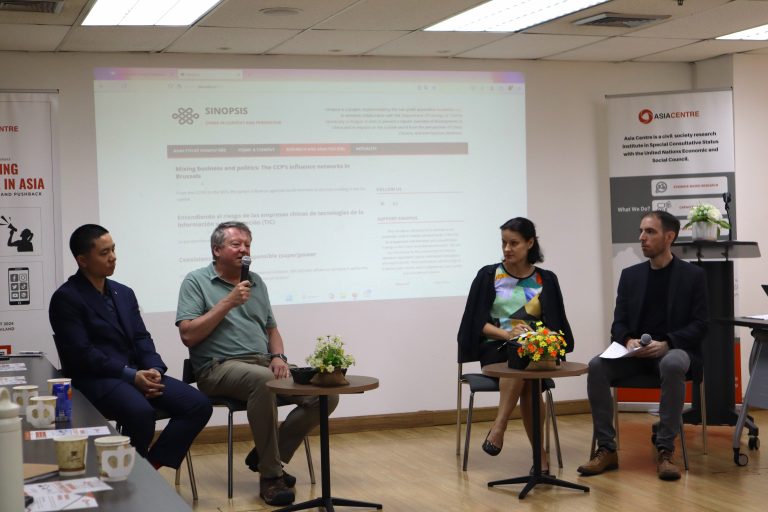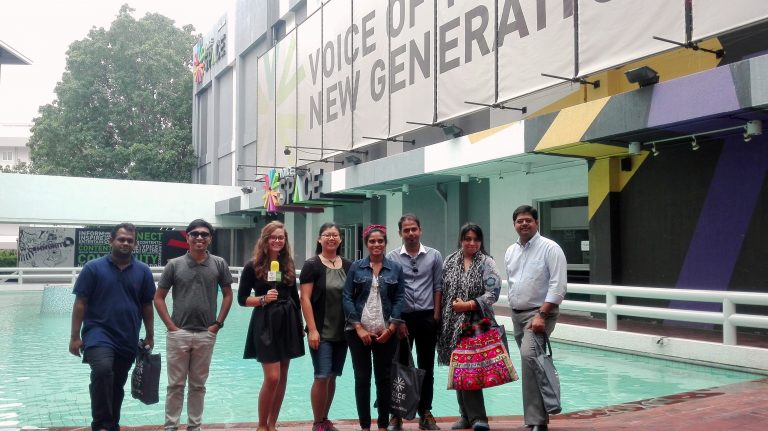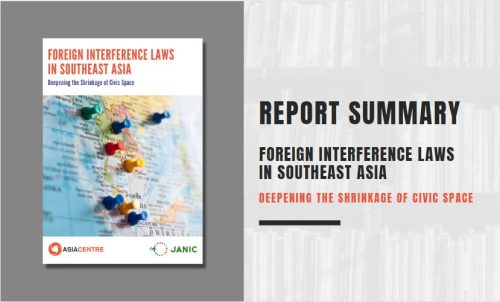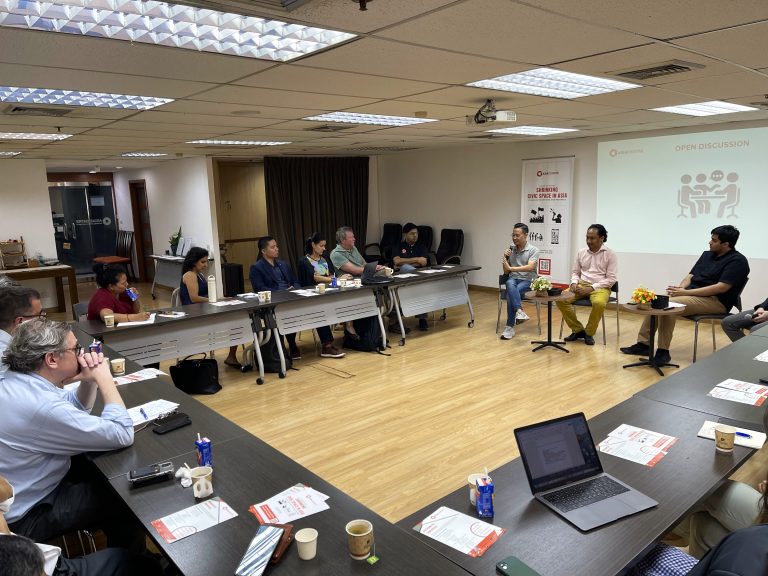
To inform Asia Centre’s research on democracy and human rights, the Centre hosted its inaugural roundtable discussion on “China’s Global Influence: Perspective from the Euro-Atlantic and Indo-Pacific” on 1 February 2024. As an inaugural meeting, the aim was to examine and discuss the different perspectives on China’s influence in the regions.
The meeting examined the potential opportunities and conflicts associated with China’s growing economic and political influence, particularly in Southeast Asia and Europe. The event was held in collaboration with Sinopsis, a project implemented by the non-profit association AcaMedia, in scholarly collaboration with the Department of Sinology at Charles University in Prague.
The roundtable convened 18 participants from the Asia Centre, Sinopsis, diplomatic missions, independent media, CSOs focusing on China, and academics at the Asia Centre’s Meeting Hub in Bangkok.
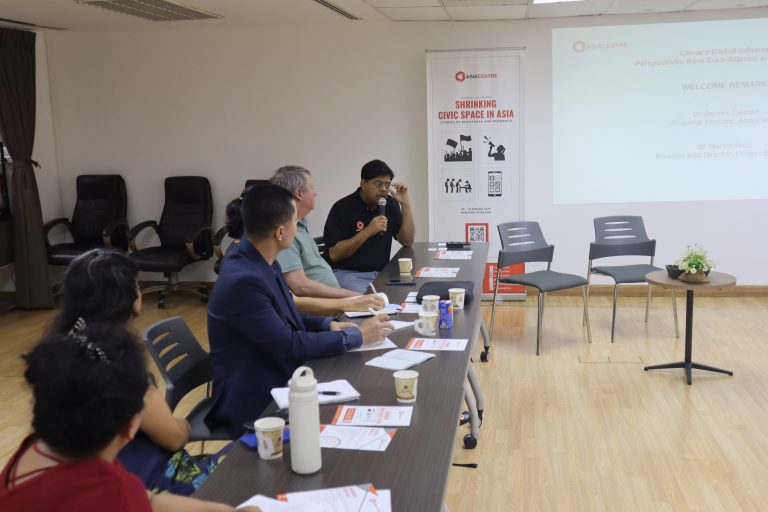
The event began with the opening remarks given, first, by Dr James Gomez, Regional Director of Asia Centre. He outlined how China’s global influence is relevant to Asia Centre’s broad suite of research on democracy and human rights, as well as ongoing concerns around shrinking civic spaces across countries. Then, Dr Martin Hála, Founder and Director of Sinopsis, underscored how China’s rapid economic development and influence across different regions worldwide significantly impact national policies and narratives.
The first panel, titled “China’s Impact in the Euro-Atlantic with Special Emphasis on Europe,” was presented by Sinopsis. First, Kateřina Procházková, Researcher and Outreach Coordinator at Sinopsis, introduced the organisation, a research project focused on scrutinising China’s global influence. She highlighted the group’s dedication to exploring the multifaceted impacts of China’s policies. Comprised of a group of sinologists, Sinopsis has published over 1,700 articles on the subject.
Dr Martin Hála, Director and Founder of Asia Centre, followed by emphasising that due to the historical homogeneity of Eastern Europe and the Czech Republic, there exists varying narratives and expectations of China in the region. As China’s influence grew, Eastern EU policy shifted direction to a focus on managing the presence of China in the region, which was accompanied by unrealistic efforts and expectations. He also elaborated on Sinopsis’ organisational objective to rectify some of the narratives in the region stemming from a lack of information and understanding.
Bao Do, Researcher and Analyst at Sinopsis, expanded on the previous points by outlining the overall lack of understanding of Chinese policies and developments, and Sinology’s role in examining the consequences and international perspectives that stem from these developments. He also stressed the importance of the sensitivities and mindfulness required when engaging with Chinese government officials, organisational representatives, and members of the Chinese public.
The second panel titled “China’s Influence in Indo-Pacific with Special Emphasis on Southeast Asia’s Media Landscape” was presented by the Asia Centre research team. Each panellist analysed China’s influence through the media sector in one specific country in the region.
Dr Marc Piñol Rovira, Research Manager at the Asia Centre, provided an analysis of Cambodia. The country has historically had strong political connections with Beijing. These connections remain robust, particularly under the leadership of Prime Minister Hun Manet. In a strategic move to enhance its geopolitical influence in the region, China has been actively leveraging the media sector to shape a favourable public opinion. Dr Pinol Rovira explained that China employs various strategies to strengthen its grip on the media landscape in Cambodia, such as forging partnerships with local media outlets, increasing the presence of Chinese media entities within the country, providing assistance for the development of information and communication technology (ICT) infrastructure, and sponsoring media training programs for journalists.
Yawee Butrkrawee, Senior Researcher at Asia Centre, followed by detailing the situation in Thailand. China utilises some key legal provisions like the Thailand Constitution and the Broadcasting and Television Business Act 2008 to increase its influence in Thailand’s media, as seen when Thai nationals are prohibited from owning media outlets, Chinese organisations register subsidiaries in Thailand and get Thai nationals to become registered subsidiaries. He then outlined other strategies that China utilises to influence the media sector, such as the signing of corporation MOUs between government departments and Chinese media groups.
Then, Kyi Thar Phone Myint, Researcher at Asia Centre, delved into Myanmar’s case to demonstrate China’s influence in the region. China’s influence in Myanmar is observed primarily through investment and influence in the expansion of information technology, software, and media in Myanmar. This includes strategies utilised by China, such as identifying and leveraging market availability throughout the growth of technology and media in Myanmar. Post the 2021 Myanmar coup, there have been complex media relations between China and the Myanmar Junta, with China reportedly siding with the Myanmar Junta in the Myanmar civil war. He finally spoke about the powerful influence of the Chinese-owned company Tiktok, and its use of young people and women in influencing media in Myanmar.
Finally, Ekmongkhon Puridej, Researcher at Asia Centre, presented an overview of the media landscape in Singapore. Notably, Singapore has a distinctive position within Southeast Asia, as it stands out as one of the few countries with an overall positive perception of China. Emphasising the significance of comprehending these dynamics, he delved into the complexities of Chinese influence in Singapore, such as China’s involvement in developing and forming Singapore and its geo-political moves to counter the dominant US influence. Furthermore, he offered a specific example of Chinese leverage within the media landscape, where Chinese newspapers published in Singapore are bound by Chinese laws, raising potential concerns about censorship and the promotion of biased narratives.
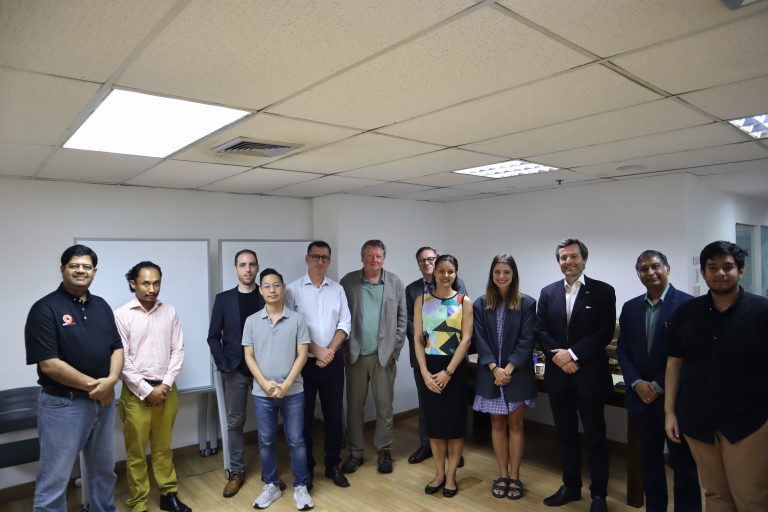
After the conclusion of the two panels, participants actively engaged in an open discussion, focusing on the overarching theme of the limited research and understanding concerning the growing Chinese influence in the Southeast Asia region, with Laos serving as a notable example. Additionally, a networking session provided participants with an opportunity to connect after the event.
The insights on China’s global influence gleaned from this inaugural roundtable discussion will inform Asia Centre’s research on democracy and human rights moving forward. A key takeaway is how Chinese influence impacts the political dynamics in Southeast Asia – a research gap the Centre hopes to address.
Asia Centre is a civil society research institute in Special Consultative Status with the United Nations Economic and Social Council. It serves as a knowledge partner and undertakes evidence-based research as well as provides capacity-building training for end beneficiaries. If you are interested in a partnership with Asia Centre to research China’s influence in the region, send an email to info@asiacentre.org.
Follow Asia Centre’s social media channels for more information.

